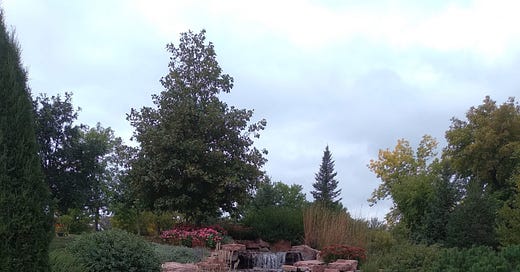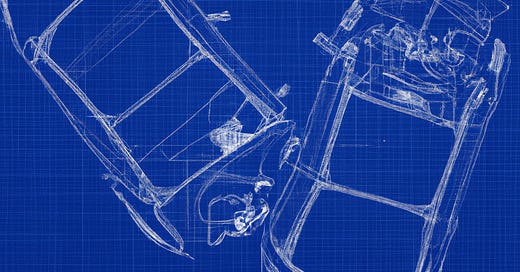
Less Expectation, More Appreciation
We enjoy warmth because we have been in the cold. We appreciate light because we have been in the darkness. We can experience joy because we have known sorrow.
I had the distinct pleasure recently of spending several days with my Aunt V on the occasion of her 90th birthday. A remarkable woman with whom I share many traits that set us apart from our respective generation of siblings - pragmatic, intensely curious, comfortable with solitude, resourceful, and above all, contrarian. In her own way, Aunt V is a practicing Stoic, although perhaps better characterized as an intuitive Stoic whereas I am more deliberate. Much of what guided her through life closely tracks what can be found in the works of Marcus Aurelius, Seneca, and Epictetus.
During a conversation at the Sioux Falls Arboretum, Aunt V shared one of her many guiding heuristics: Less expectation, more appreciation.
We had been talking about being in the present and I loved the effect this combination had on my thinking. Whether in the next minute or the next decade, expectations are always about the future. It's absurd to have expectations about the past. No mater how much we plan, actual events slip off course and can go sideways in unexpected ways. Within this fact are the seeds of worry and disappointment.
Appreciation, on the other hand, is about the present or past. From an emotional perspective, it is mostly about the present. While we're occupied with worrying and cogitating about our plans, the expectations we have about things that may or may not happen actually prevent us from appreciating how things are in the present.
"The present is the same for everyone; its loss is the same for everyone; and it should be clear that a brief instant is all that is lost. For you can’t lose either the past or the future; how could you lose what you don't have?" - Marcus Aurelius, Meditations, 2.14
By all means, make good plans. And when they are in place, let them unfold and appreciate how that happens in the present. Doing so places us in a much more resourceful position to respond to actual events rather than blind ourselves with expectations.
To shift perspective, what can we do when we are subjected to the expectations of others, particularly when we've failed to meet someone else's unstated expectations (or assumptions?)
When I was much younger, and someone expressed disappointment (a favorite word of my dad and a few elementary school teachers) in my ability to decipher their unstated expectations, their words would land on my ears as harsh judgements. In time I learned that their model of the world, based largely on information starved assumptions and expectations, was the actual failure. They weren't telling me how I had failed, they were expressing in great detail how they were failing at interacting with the world around them. From this moment on, anyone's verbal or behavioral expression of "disappointment" became information gold. Understanding how their world worked, coupled with a clear assessment of how I could modify my actions to better collaborate made finding a way forward a much more straightforward process. Seasoned, of course, with just the right amount of forgiveness.
Sadly, not everyone is open to the idea their assumptions are inaccurate and their expectations poorly calibrated. There is little recourse here other than take the high road, express kindness, and move on - leaving them behind you as best you can.
Aunt V's heuristic pairs well with another favorite from Erik Seidel: Less certainty, more inquiry.
If you have any questions, need anything clarified, or have something else on your mind, please use the comments section or email me directly.
Photo credit: Author, The Mary Jo Wegner Arboretum and East Sioux Falls Historic Site, Sioux Falls, South Dakota











Less expectation, more appreciation. I love it. I've been keeping a gratitude journal since May 25, 2021. I try to write a line or 2 each day (its a small Moleskine notebook). I don't always write. And you can track where I am "living below the line" in "trance" as per Tara Brach by way of Joseph Campbell when I skip many days in a row. But the practice has been completely worthwhile. Over time, I have found that I am actively LOOKING for things to appreciate.